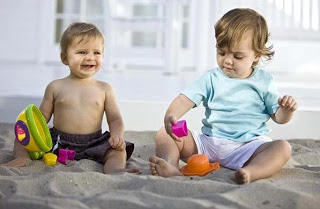 It’s a question I get asked often. Your toddler throws a wobbler that would put a PMS sufferer to shame; and they do so – shudder – in public!This is when you wish you’d never tutted at those women struggling around supermarkets with the child from hell. Toddlers encounter frustrations at every turn. Your child may want to do things but be unable to because she is not allowed, or because she doesn’t quite have the skills yet. Or she maybe overtired, hungry, or being exposed to environments which are over-stimulating (most shopping mall tantrums fall into this latter category). Worse still, having an audience to witness your toddler’s tantrum can put you pray to judgypants folk like me.
It’s a question I get asked often. Your toddler throws a wobbler that would put a PMS sufferer to shame; and they do so – shudder – in public!This is when you wish you’d never tutted at those women struggling around supermarkets with the child from hell. Toddlers encounter frustrations at every turn. Your child may want to do things but be unable to because she is not allowed, or because she doesn’t quite have the skills yet. Or she maybe overtired, hungry, or being exposed to environments which are over-stimulating (most shopping mall tantrums fall into this latter category). Worse still, having an audience to witness your toddler’s tantrum can put you pray to judgypants folk like me.
The good news is that public tantrums become very rare between the ages of 4 and 6 as your child develops social awareness, and so would usually be too embarrassed to start shouting in public. But what is a frazzled parent to do until then? Read on…
Deep breaths

First off, it is essential that you remain calm; they can smell fear like they can smell a Greggs sausage roll. It is all too easy to overreact in front of an audience’s watchful stares. You become so concerned about what other people are thinking, that the tantrum will probably provoke a far stronger response in you than one that takes place in your own home; and your mini Russell Crowe will clock onto this. Your anxiety will feed your toddler’s anxiety and the tantrum will escalate. With all eyes suddenly swivelled in your direction, wondering how you are going to handle things, ignoring your toddler’s tantrum can be hard. Yet pretending to take no notice can often help to calm things down. By withholding your attention, you are sending a clear signal to your toddler that tantrums will not get them what they want. However ignoring doesn’t come naturally, so here’s my five point plan:
- Stay as calm and quiet as possible.
- Avoid commenting in any way.
- Keep your facial expressions neutral.
- Avoid eye contact.
- Avoid physical contact (aside from safety measures).
If you go down the ignoring route, it is worth remembering that in most cases your toddler’s tantrum will escalate or intensify before it stops. It is therefore important to stick with it soilder. If you crumble while your toddler is upping the ante, they will naturally assume that by behaving worse, they have made you give in, which obviously sets a dangerous precedent. However, if you feel that ignoring isn’t for you, try the following…
Distract
One of the most effective methods of defusing a brewing tantrum is by taking your toddler’s mind off whatever has pissed them off. This is particularly effective in public, as there is usually so much going on around you. Distraction can be as simple as pretending that something amazing has just happened at the other side of the store to offering your toddler something different to play with (a small bag of unusual items should always be packed when you venture outside your fortress). You will find that once your toddler’s attention has been diverted, they quickly forget whatever it was that lit their fuse. If however, your toddler’s tantrum has progressed so far past the starting gate that distraction is futile, it’s time to move on to the next step…
Remove
If you manage to successfully keep a lid on your emotions (a whisky in the toilet can help), it is hoped that your toddler will begin to calm down. But if your toddler is still hammering around like the Gruffalo on speed, or worse – their tantrum is moving up a level from Tazmanian Devil to THE devil, you might want to consider removing them from the situation. Maybe that means leaving a friend’s house and going home, or abandoning your supermarket shop and withdrawing to the car. If in a restaurant, the toilets may offer a more private place for your toddler to blow off steam (and for you to down a vodka or two). Sometimes just the simple act of taking your toddler away from the setting where the tantrum erupted can defuse it. Other times however, you may not be able to remove your toddler from the situation, for example, if you are in an aeroplane with the seat belt signs on. When this happens, it really is a case of just gritting your teeth and waiting for the storm to pass (whilst signalling to the air hostess that you would like a double brandy).
Debrief Inlaws
A public tantrum can be bad enough, but one in front of either your own parents or your in-laws can be even worse as you will probably feel even more scruitinized. In this circumstance, it will help to speak to the grannies about the tantrums beforehand and the various ways you are trying to deal with them. Ideally, this will stop Grandma from stepping in or offering counter-productive advice; although the receptiveness of the average mother-in-law is as temperamental as the British weather.
Hold Your Fort
Don’t be tempted to give your toddler whatever it is they want just because a public tantrum looms. Like buying Playdoh when you have a carpeted house, this seems like a good idea at the time, but causes more hardship in the long run. Stand firm, and don’t try to reason with your toddler. Reasoning is a waste of time. Telling your toddler that they can’t have a toy because you bought them a present yesterday will have as much impact as explaining to your husband why you’ve decided to switch face creams – it will fall on deaf ears. Your toddler will not listen to any form of reason or explanation in the throws of a tantrum, and will actually be incapable of hearing you if the tantrum has escalated to THE devil variety. Save the reasoning and explanations for afterwards, when your toddler has calmed down and will be more receptive.
Allies
Finally, remember that most of the people you believe to be judging you are probably parents themselves, and they have in all likelihood been through exactly the same situation. As such, any looks you get when your toddler is throwing a tantrum in public are far more likely to be knowing glances and sympathetic smiles. If they are not parents, rest assured, they will get theirs in due course, heh, heh.
Keep a Record
It can help to keep a record of your toddler’s tantrums (not very uplifting bedtime reading for sure, and certainly not one for granny’s memory box). In the relief of the tantrum ending, it is all too easy to forget exactly what occurred and any lessons you could have learnt from the situation. A record will help you document the facts – it will give you a clear picture of what is happening to your toddler. Furthermore, it can be a great bribing tool when you tell your child that you will pass the tantrum record onto Santa/Daddy/Headteacher if he doesn’t eat his peas (psyche!)
Your record could include the following information:
- What usually leads to your toddler having a tantrum?
- Where do the tantrums usually occur?
- Does it happen more around a particular person?
- How often do they last?
- Describe your child’s behaviour during a tantrum.
- Where would you place it on the tantrum spectrum?
- Describe what you typically do during the tantrum.
- How does your toddler’s tantrum make you feel.
If you’ve got particularly big balls, you could post your tantrum records up here, so we can all have a gander and compare notes.
Good luck comrade.










